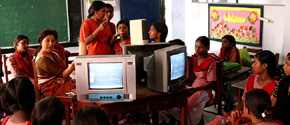What we do

We digitally record live classes by the best grassroots teachers, collect them in a large distributed database, and distribute them to poor rural and slum schools. Education experts and teachers use the system to explore pedagogical approaches involving local teachers who actively "mediate" the video lessons. By harvesting a "viral phenomenon" of community participation, DSH aims to help train teachers and deliver quality instruction to underprivileged children. The project is a collaboration between technology and education experts.
Teachers at spoke schools use the videos to provide high-quality instructions to their students and train themselves too in the process. Various delivery channels like DVDs, Web and Media Projectors are being used to make the content available at the spoke schools where a teacher or mediator periodically pauses the video and engages the students in various activities based on what has just occurred on TV. These activities may include asking questions, inviting kids to do board work, and organizing role-playing activities. The mediator's job is to make his or her class as lively, dynamic, and interactive as the one conducted by the model teacher on TV. In effect, the video and the mediator form a "team," the video provides an example, a framework, a lesson plan, and a content and methodology model; while the mediator, who may not be highly skilled in some domain-specific knowledge, supplies the crucial interactive element. The main aspects of DSH are:
- A "people's database of everything"
- A network of hubs and spokes
- Mediation-based pedagogy
- Technology for sharing community-generated video
DSH won the 2007 ACM Eugene Lawler Award for Humanitarian Contributions within Computer Science and Informatics, and the top prize in the education category of the 2008 Tech Awards by the Tech Museum of Innovation. We hope to eventually scale up the system to cover a far greater number of children, contributing toward the Millennium Development Goal of universal primary education.